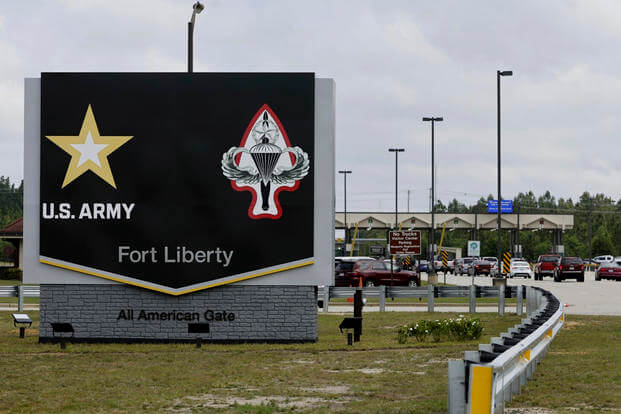Fort Bragg, North Carolina, was redesignated as Fort Liberty on Friday, marking it as the only major Army base not having a namesake honoring a significant figure in the force's history.
Fort Liberty is broadly considered one of the Army's highest-profile installations, serving as the home of the service's 82nd Airborne Division -- set to deploy anywhere in the world within hours, Special Forces and the secretive Delta Force.
The move is a part of the Defense Department's ongoing effort to scrub namesakes honoring Confederate rebels who took up arms against the U.S. during the Civil War, largely to preserve slavery in the South. Fort Liberty is one of nine Army bases being renamed, and the ceremony there Friday means the effort is more than halfway complete.
Read Next: Defense Secretary Orders No Drag Shows on Military Bases After Political Furor
"This community ... will know we are ready to ensure the liberty of our citizens everywhere," Lt. Gen. Christopher Donahue, commander of XVIII Airborne Corps and Fort Liberty, said at the redesignation ceremony Friday morning.
Fort Liberty will be unique among the Army's portfolio -- the only major installation without a namesake honoring a war hero or otherwise influential figure in the service's history, despite a long list of Medal of Honor recipients in the airborne and Special Forces communities, among other notable veterans.
Donahue said that officials considered a massive roster of names including Master Sgt. Gary Gordon, a Delta Force operator who was awarded the Medal of Honor posthumously for his actions during the Battle of Mogadishu in Somalia and immortalized in the movie "Black Hawk Down."
He and Sgt. 1st Class Randy Shughart, another Medal of Honor recipient, fought their way to a crashed Black Hawk helicopter to protect the surviving pilot, Chief Warrant Officer Mike Durant. A massive Somali militia eventually overran the position. Durant was taken prisoner but survived.
"They knew they were going to their deaths, still went," Donahue said.
Other options Donahue cited included Master Sgt. Roy Benavidez, a Green Beret who earned the Medal of Honor for actions in Vietnam where he carried multiple dead and wounded teammates to a helicopter while severely wounded himself and under intense fire. Another was Sgt. Alvin York, who received the Medal of Honor for actions in World War I after leading an attack on a German machine gun nest, killing 25 enemy soldiers and taking 132 prisoners.
"Every name was considered, debated," Donahue said. "Any of them could have been chosen. But how do you choose any and leave those others behind?"
Braxton Bragg, the base's old namesake, is broadly seen as one of the Confederate army's least successful commanders. He was known for his quick temper. He attempted to invade Kentucky in 1862 but was swiftly forced to retreat after suffering significant casualties and being outmaneuvered by Union forces. Bragg had to retreat again after the Battle of Stones River, a major Union victory and turning point for the war.
He is generally credited with the victory in the Battle of Chickamauga, the first major battle in Georgia and among the most significant defeats of the Union in that theater. While it was a tactical victory at the time, it came at a massive cost for the rebels, in which more than 2,300 of its soldiers were killed -- nearly 700 more fatalities than the Union.
In addition to the military base, there is also a California beach town also named Fort Bragg honoring the Confederate general. There have been efforts in recent years from lawmakers and activists to change the name, but local leaders have not come to a consensus.
The service is also set to rename Fort A.P. Hill, Virginia; Fort Gordon, Georgia; and Fort Polk, Louisiana, in the coming months.
-- Steve Beynon can be reached at Steve.Beynon@military.com. Follow him on Twitter @StevenBeynon.
Related: Fort Benning Is Now Fort Moore












